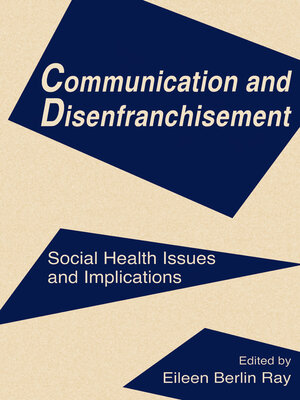Communication and Disenfranchisement
ebook ∣ Social Health Issues and Implications · Routledge Communication Series
By Eileen Berlin Ray

Sign up to save your library
With an OverDrive account, you can save your favorite libraries for at-a-glance information about availability. Find out more about OverDrive accounts.
Find this title in Libby, the library reading app by OverDrive.



Search for a digital library with this title
Title found at these libraries:
| Library Name | Distance |
|---|---|
| Loading... |
This volume and its companion case studies book deal with some of the people, groups, and classes who are living a disenfranchised existence in the United States. Whether through birth, life events, or unfortunate circumstances, they are denied full privileges, rights, and power within the existing societal structure. Centered around societal health problems as they relate to socioeconomic status, family, abuse, and health concerns, these volumes examine salient issues from several theoretical frameworks, including feminist theory and the social construction of reality.
Communication and Disenfranchisement provides theory-based essays on topics such as the homeless, adult survivors of sexual assault, battered women, persons with disabilities, impoverished women, the indigent living in the inner city, persons with HIV/AIDS, the terminally ill, and the elderly.
Case Studies in Communication and Disenfranchisement provides parallel case studies, applying the issues and concepts discussed in the essays. Used together, these books provide theoretically-based applications of social health issues within a communication framework.
Traditionally, health communication research has emphasized the communication-physical health relationship. Inadvertently, this primary focus has restricted what information has been included under the domain of health communication. These books expand that domain by examining how the communication-disenfranchisement relationship is accomplished, managed, and overcome, and by recognizing the significance of the pragmatic and theoretic implications of this inquiry.







